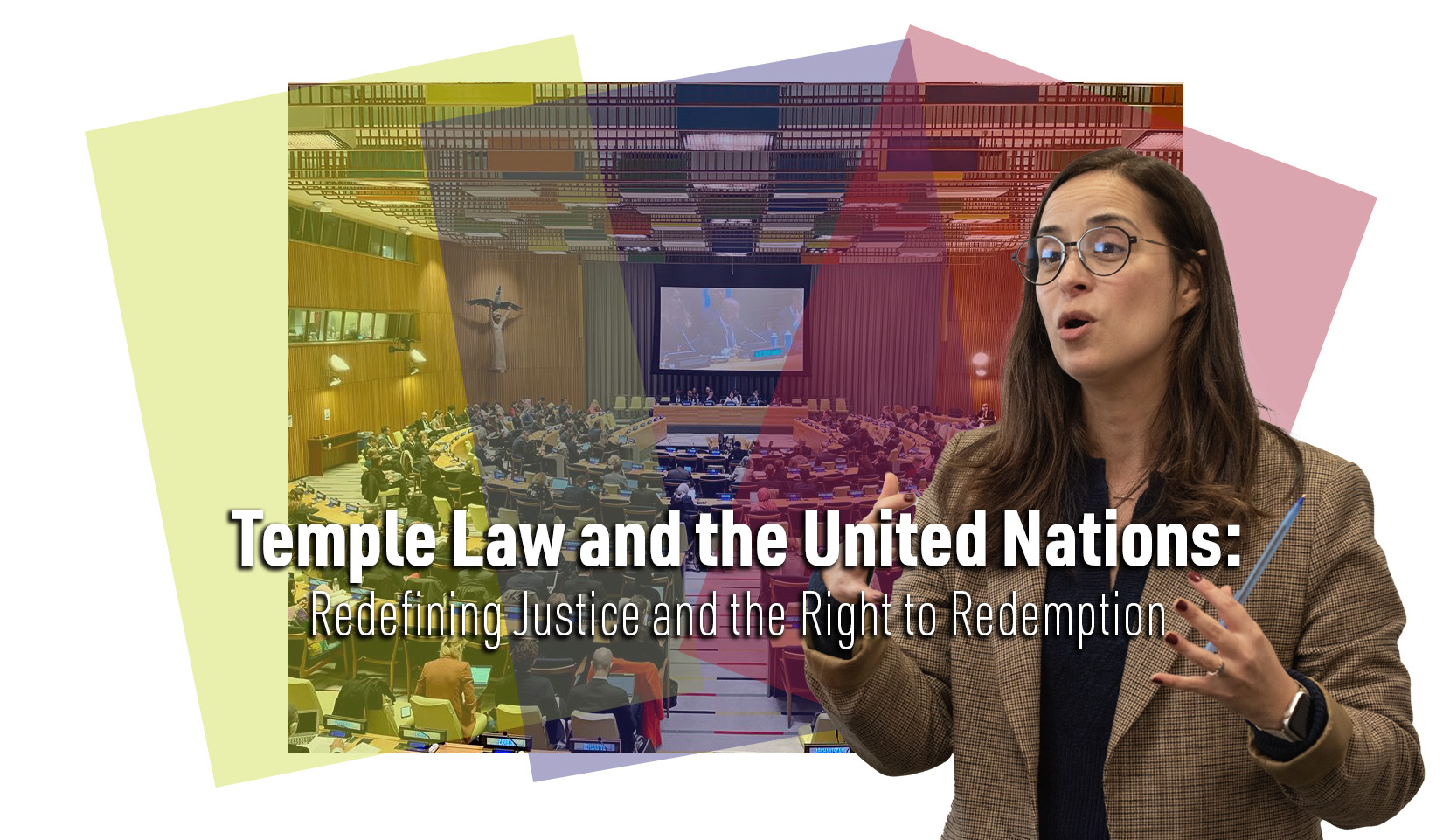
Temple Law Professor Rachel López Advocates for Human Rights in Landmark Case
This is the fourth article in a series about how faculty from Temple Law are helping to shape law and policy at an international level. The professors highlighted in this series have ties to the United Nations, are actively involved in roles that have an impact on the global stage, and are putting international law theory into practice.
Temple Law Professor Rachel López is at the forefront of a transformative legal battle challenging the constitutionality of life without parole sentences in Pennsylvania. Her efforts span from domestic courts to international human rights forums, advocating for a “right to redemption” as a fundamental human right.
The Case of Derek Lee: A Catalyst for Change
In 2016, Derek Lee was convicted of second-degree murder for his involvement in the 2014 fatal shooting of Leonard Butler during a robbery attempt in Pittsburgh. Sentenced to life without parole, Lee himself was not involved in the murder—his accomplice fatally shot the victim—but Lee was convicted of second-degree murder, stemming from the unintentional death that occurred while the defendant was committing a felony.
Lee’s story is emblematic of the legal and moral issues surrounding life without parole sentences in Pennsylvania. His case highlights the severe consequences of Pennsylvania’s sentencing laws, which mandate a sentence of life without parole for both first- and second-degree murder. Unlike first-degree murder, second-degree charges do not require intent to kill, meaning individuals like Lee can face the harshest penalty available under state law without premeditating or even intending harm.
Professor Rachel López, a leading voice in the fight against such sentences, sees Lee’s case as a stark example of the broader systemic issues.
“Derek Lee’s story is about more than just one person,” López explains. “It’s about a system that denies individuals the possibility of redemption, no matter their circumstances or capacity for change.”
Lee’s conviction resulted from a situation where he lacked direct intent to kill. Despite this, Pennsylvania law offered no alternative but life without parole. This has drawn scrutiny not just from legal experts but also from human rights advocates who argue that the punishment is disproportionately severe and fails to account for the nuances of individual cases.
“The argument before the Pennsylvania Supreme Court focuses on abolishing life without parole for second-degree murder,” López explains. “These sentences deny individuals any hope of redemption and are a violation of fundamental human rights.”
Bridging Domestic and International Law
In 2021, Professor López published an article titled Redeeming Justice which was co-authored with Terrell Carter and Kempis Songster. Along with a group of other incarcerated men who were all serving life without parole sentences, they developed the concept of the right to redemption, based on their lived experience. The article argues that life without parole amounts to death by incarceration—a term first coined by a group that included Carter and Songster—and is a violation of international human rights law, because it denies the right to redemption.
Their scholarship gained international recognition, winning the 2022 Law and Society Association (LSA) Article Prize, and played a pivotal role in the commutation of co-author Terrell Carter’s sentence. Carter had spent 30 years in a Pennsylvania prison for second-degree murder before his sentence was commuted by Governor Tom Wolf in 2022.
“The district attorney cited Redeeming Justice in a letter to the Board of Pardons in support of Terrell’s petition for commutation,” López recalls. On the day she accepted the award from the LSA in Portugal, the governor signed the commutation, granting Carter’s freedom.
Their article also informed efforts by a coalition of advocates, including López, who filed multiple petitions before the United Nations. These efforts have led the UN to formally acknowledge life without parole as a human rights violation. “The UN has now formally adopted the term ‘death by incarceration’,” Professor López said.
Temple Law Connections and Broader Impacts
The Lee case is also connected to Temple in another way. One of the groups that filed the lawsuit was Amistad Law Project, which was co-founded by Temple Law graduates Kris Henderson ‘12 and Nikki Grant ‘12. In recognition of her past advocacy, the petitioners asked Professor López to represent a group of UN experts, submitting an amicus brief on their behalf to the Pennsylvania Supreme Court.
“The abolition of life without parole for second-degree murder would be a significant step toward aligning Pennsylvania’s laws with human rights standards,” she said.
At the core of Professor López’s advocacy is the belief in the human capacity for change. “All human beings have the ability to atone, and this should be reflected in the law,” she said. Drawing inspiration from international norms, López points to Latin America and Europe, where life without parole is largely abolished. “These regions recognize that indefinite denial of hope is inherently inhumane.”
López emphasizes that this fight is about more than legal arguments; it’s about human dignity. “To deny someone the opportunity for redemption is to deny their humanity.”
